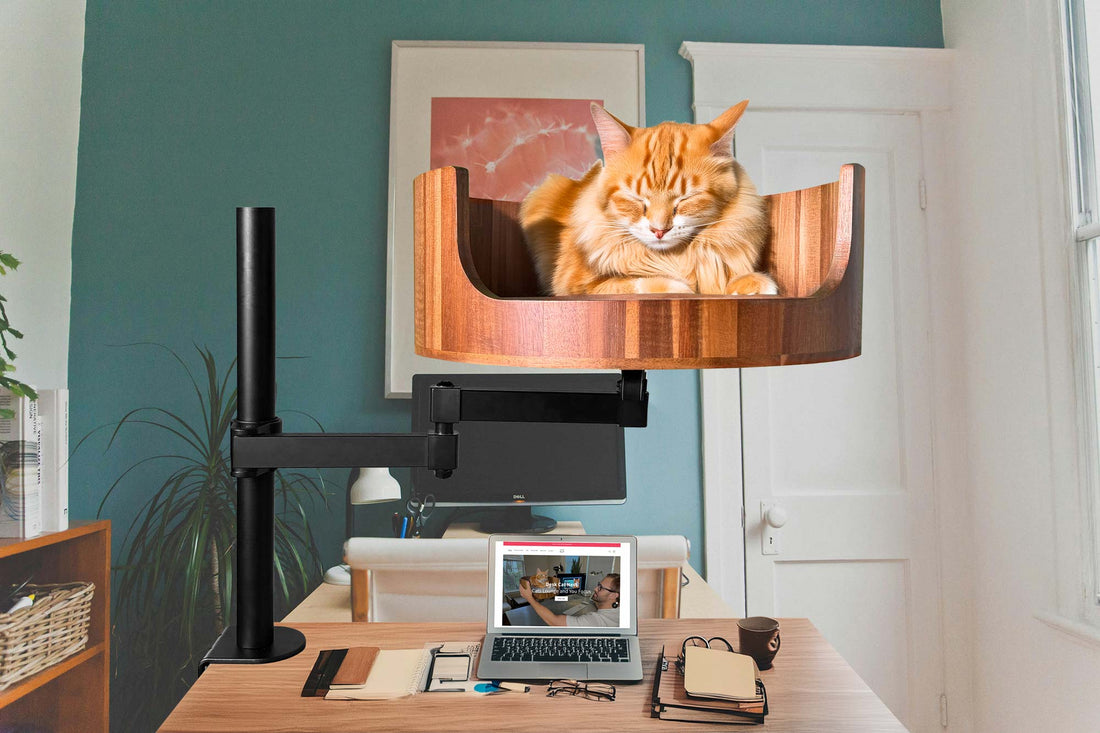
Why Does My Cat Quiver in Her Sleep? Understanding It
Share
Have you ever noticed your cat quivering or twitching in their sleep? It can be a peculiar sight to see, but rest assured, it is actually quite common among feline companions. Understanding why cats exhibit this behavior can provide insight into their sleeping habits and overall well-being. In this article, we will delve into the reasons why cats quiver in their sleep and what it can reveal about their physical and mental state.
Desk Cat Nest aims to unravel the mystery behind this intriguing behavior by exploring the various factors that may contribute to it. From dreams and deep sleep cycles to underlying health issues, there are several reasons why cats may quiver in their sleep. By understanding the possible explanations for this phenomenon, cat owners can better care for their furry friends and ensure that they are happy and healthy. So, if you have ever wondered why your cat twitches or shakes while catching some Z’s, read on to uncover the fascinating reasons behind this behavior.
1. Cat quivering during sleep is a normal behavior that could be linked to dreaming, muscle twitches, or neurological activity.
2. Cats may exhibit different types of quivering, including minor tremors, full-body shivers, or twitching of specific body parts.
3. Factors such as age, health conditions, and environmental stressors can influence a cat's quivering during sleep.
4. Observing your cat's quivering behavior can help you better understand their overall health and well-being.
5. Consulting with a veterinarian is recommended if you notice any unusual or concerning quivering patterns in your cat's sleep.
Causes of Cat Quivering in Sleep
There are several reasons why your cat may quiver in her sleep. One common cause is dreaming. Cats, like humans, experience different sleep stages, including REM (rapid eye movement) sleep, during which dreaming occurs. When your cat is in the REM stage, she may twitch or quiver as she acts out her dreams. Another reason for cat quivering could be related to muscle twitches or spasms. Just like humans, cats can have involuntary muscle movements while sleeping, which may manifest as quivering. Additionally, underlying health conditions such as neurological disorders or pain can also lead to quivering during sleep.
Observing Quivering Behavior in Cats
If you notice your cat quivering in her sleep, it's essential to pay attention to other signs and behaviors to determine if it's a cause for concern. Watch for any unusual sounds, movements, or facial expressions during quivering episodes. Take note of the frequency and duration of the quivering episodes to see if there is a pattern. It's also helpful to observe your cat's overall health and behavior while awake, as any changes or abnormalities could indicate an underlying issue causing the quivers during sleep.
Consulting with a Veterinarian
If you are concerned about your cat's quivering behavior during sleep, it's best to consult with a veterinarian. A vet can conduct a thorough physical exam, review your cat's medical history, and perform any necessary tests to determine the underlying cause of the quivering. They may also recommend treatment options or lifestyle changes to help alleviate the quivering episodes and improve your cat's overall well-being. It's essential to address any health concerns promptly to ensure your cat receives the necessary care and support.
Frequently Asked Questions
Why does my cat quiver in her sleep?
It is normal for cats to occasionally quiver or twitch while they sleep. This behavior is usually harmless and could be caused by dreaming or slight muscle spasms. However, if you notice excessive or continuous quivering, it may be a sign of an underlying health issue and you should consult your veterinarian.
Will a Desk Cat Nest help my cat stop quivering in her sleep?
While a Desk Cat Nest can provide a comfortable and cozy sleeping environment for your cat, it may not necessarily prevent them from quivering in their sleep. Quivering is a natural behavior for many cats and can be influenced by various factors. However, providing a comfortable and stress-free environment for your cat can help improve their overall well-being.
Should I be concerned if my cat quivers in her sleep frequently?
If your cat is quivering in her sleep frequently or intensely, it is recommended to monitor their behavior and consult with a veterinarian if you have any concerns. Excessive quivering could be a sign of pain, discomfort, or an underlying health issue that requires medical attention.
Can stress or anxiety cause my cat to quiver in her sleep?
Stress and anxiety can certainly contribute to changes in your cat's behavior, including quivering in their sleep. Providing a calm and safe environment for your cat, along with regular playtime and mental stimulation, can help reduce stress and anxiety levels, which may in turn decrease quivering episodes during sleep.
In conclusion, the Desk Cat Bed is a valuable choice for providing your cat with a comfortable and secure sleep environment. With its plush cushioning and cozy design, it offers the perfect spot for your feline friend to relax and unwind. By providing a designated sleeping area, you can help alleviate any stress or anxiety that may be causing your cat to quiver in her sleep. Invest in the Desk Cat Bed today to ensure that your furry companion gets the peaceful rest she deserves.



















































